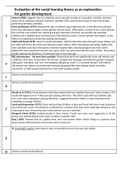for gender development
Huston (1985): Suggests that it is relatively easy to get girls to take on ‘masculine’ activities, but boys
show a lot of resistance towards ‘feminine’ activities (This could be due to lack of male role models
performing feminine activities).
Perry and Bussey (1979): Showed film clips to children aged eight and nine. In the film boys and girls
were seen selecting an apple or pear (gender neutral items). When given a choice of fruit, boys selected
the fruit they saw another boy selecting and girls selected a fruit they saw another girl selecting.
S Children only modelled same-sex behaviour if the behaviour didn’t counter gender stereotypes, so the
effects of modelling are limited by existing stereotypes.
Smith and Lloyd (1978): Used 4-6 month old babies. Half the time they were dressed in boys clothes and
the other half of the time they were dressed in girls clothes. When interacting with adults, babies that
were assumed to be boys were given a hammer shaped rattle, and encouraged to be more active.
Babies that were assumed to be girls were given ‘girly’ toys and were told they were ‘pretty’. Shows that
gender appropriate behaviour is reinforced from a very early age.
BBC documentary – No more boys and girls: Showed that girls have significantly lower self esteem and
confidence than boys. Found when the teacher changed their language towards both genders (stopped
calling girls ‘sweetpea’ and ‘love’ and stopped calling boys ‘mate’), it increased the girl’s self-esteem.
P Self esteem was further increased when introducing people like male makeup artists or female
mechanists, as both groups believed they were both equally capable.
(Same as social learning theory)
I
(Same as social learning theory)
A
Martin et al (1995): Found that pre-school boys played with toys labelled ‘boys toys’ (direct tuition). This
would still happen even I =f they saw girls playing with them. They didn’t play with toys labelled ‘girls
toys’ even when seeing boys playing with them. Suggests that direct tuition is more important than
modelling in younger children.
Lamb and Roopnarine (1979): Observed preschool children at play and found that when male behaviour
was reinforced in girls, the behaviour continued for a shorter time than when male-type behaviour was
C reinforced in boys. Shows that peer reinforcement acts as a reminder.
Margaret Mead (1935): Studied people in New Guinea. Found men were more aggressive in all the
groups she studied despite some large variations in gender roles.
Buss (1989): Showed that on a global level, men and women desire similar things in a partner (men
desire physical attractiveness and women desire resources).
✘ Unscientific studies: Many factors were uncontrolled as very few were lab studies.
E
D (Same as social learning theory)



